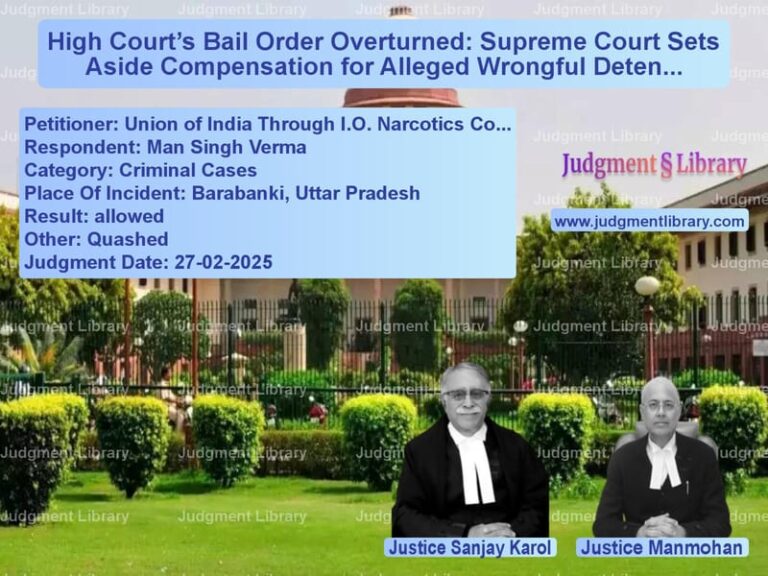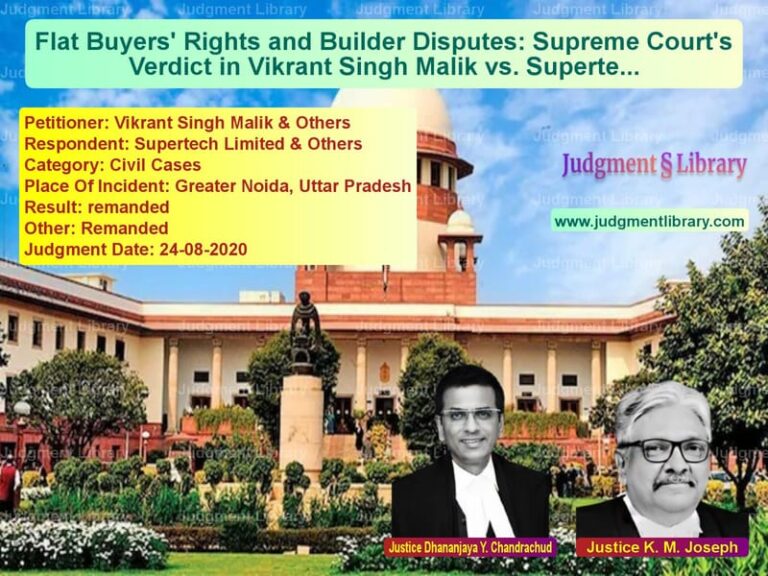Murder Conviction Overturned: Supreme Court Acquits Accused Due to Investigation Lapses
The Supreme Court of India recently delivered a significant judgment in a criminal appeal filed by S. Subbulaxmi against the acquittal of Kumarasamy and others in a murder case. The Court upheld the High Court’s decision to overturn the conviction of the accused, citing major inconsistencies in the prosecution’s case and significant lapses in the investigation. This ruling underscores the necessity of credible evidence and fair trial procedures in criminal cases.
Background of the Case
The case involved a family dispute over agricultural land, which ultimately led to the murder of Subbulaxmi’s husband, Subramani. The accused, Kumarasamy (A1), his cousin Palanisamy (A2), and his wife Vasanthamani (A3), were alleged to have killed Subramani due to a long-standing conflict over land ownership.
According to the prosecution, on September 15, 1994, the accused confronted Subramani and attacked him with an iron rod and wooden sticks, inflicting fatal injuries. The deceased’s wife, S. Subbulaxmi, who witnessed the crime, filed a complaint with the police. The trial court found the accused guilty under Sections 34, 302, and 506(II) of the Indian Penal Code (IPC) and sentenced them to life imprisonment.
However, the High Court of Madras overturned the conviction, leading Subbulaxmi to file a criminal appeal before the Supreme Court.
Arguments of the Petitioner (S. Subbulaxmi)
The petitioner, Subbulaxmi, argued that:
- The High Court had ignored crucial evidence, including the testimony of an eyewitness (PW1), who was present at the crime scene.
- The forensic reports, medical evidence, and the recovery of the murder weapon all corroborated the prosecution’s case.
- The accused had a strong motive to commit the crime due to a property dispute.
- The acquittal of the accused was a miscarriage of justice.
Arguments of the Respondent (Kumarasamy & Ors.)
The defense countered with the following arguments:
- The entire case was fabricated due to the long-standing property dispute between the families.
- The prosecution’s timeline was inconsistent, and there was no conclusive evidence linking the accused to the crime.
- The statements of key witnesses were contradictory, and the investigation was biased.
- The police failed to conduct a proper forensic examination and did not follow standard procedures in recording evidence.
Supreme Court’s Analysis and Judgment
The Supreme Court meticulously reviewed the evidence and highlighted several inconsistencies in the prosecution’s case:
“Having carefully considered the materials available on record, we find that the prosecution has failed to establish the guilt of the accused beyond reasonable doubt. The discrepancies in the eyewitness testimonies and the lapses in the investigation significantly undermine the prosecution’s case.”
The Court noted the following key issues:
- The FIR contained interpolations and alterations, changing the timing of the incident.
- The prosecution failed to explain the delay in filing the FIR, creating doubts about its authenticity.
- The forensic reports did not conclusively match the alleged murder weapon with the injuries sustained by the deceased.
- The investigating officers did not take proper statements from the accused and key witnesses.
The Supreme Court ruled that the High Court was correct in acquitting the accused, as the prosecution had not proven their guilt beyond reasonable doubt.
Key Directives of the Supreme Court
- The appeal was dismissed, affirming the High Court’s order of acquittal.
- The accused were cleared of all charges.
- The Court criticized the investigating officers for their lack of due diligence.
- The judgment reinforced the principle that no conviction should be based on weak or manipulated evidence.
Final Verdict
The Supreme Court upheld the acquittal of the accused, emphasizing that the prosecution had failed to present a solid case. The ruling reaffirmed the importance of fair trials and credible evidence in criminal cases.
Implications of the Judgment
This landmark ruling has important implications for the criminal justice system:
- Strengthens the principle that an accused person is innocent until proven guilty beyond reasonable doubt.
- Encourages law enforcement agencies to conduct thorough and impartial investigations.
- Discourages fabricated cases based on personal enmities and disputes.
- Ensures that fair trial standards are upheld in criminal prosecutions.
This judgment highlights the role of the judiciary in preventing wrongful convictions and ensuring justice through due process.
Don’t miss out on the full details! Download the complete judgment in PDF format below and gain valuable insights instantly!
Download Judgment: S. Subbulaxmi vs Kumarasamy & Ors. Supreme Court of India Judgment Dated 06-07-2017.pdf
Direct Downlaod Judgment: Direct downlaod this Judgment
See all petitions in Murder Cases
See all petitions in Bail and Anticipatory Bail
See all petitions in Fundamental Rights
See all petitions in Judgment by N.V. Ramana
See all petitions in Judgment by Prafulla C. Pant
See all petitions in dismissed
See all petitions in supreme court of India judgments July 2017
See all petitions in 2017 judgments
See all posts in Criminal Cases Category
See all allowed petitions in Criminal Cases Category
See all Dismissed petitions in Criminal Cases Category
See all partially allowed petitions in Criminal Cases Category







